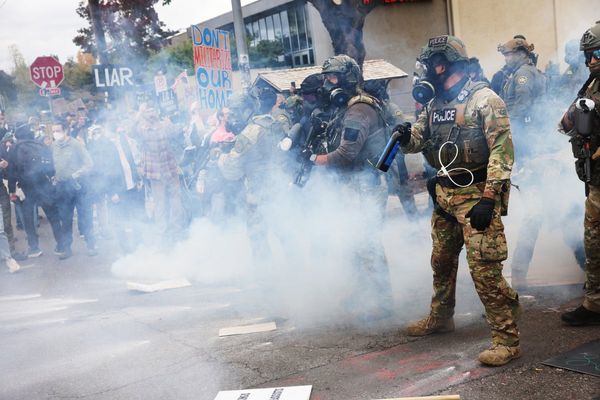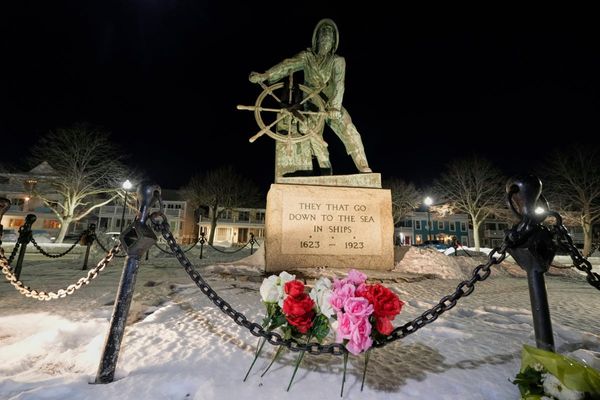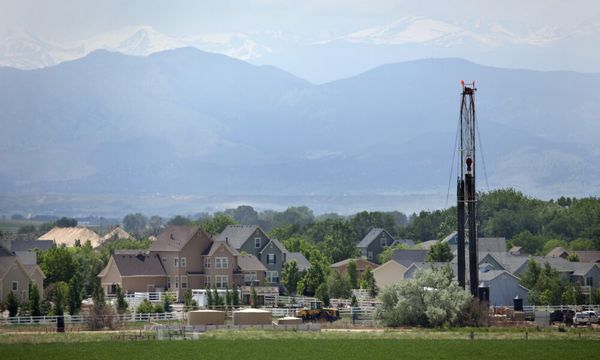
Leading up to the Winter Paralympics opening ceremony there were doubts Ukraine’s team of 20 athletes would reach China and the prospect that even if they made it they could be sharing podiums with Russian athletes even as Russian tanks rolled towards Kyiv.
The International Paralympic Committee’s (IPC) late U-turn to ban Russia avoided that scenario and after a fraught four-day journey and an emotional entrance into the Bird’s Nest stadium in Beijing the Ukraine team has gone on to all but ensure they will finish second in the medal table, the highest position since they started competing as an independent country in 1996.
Before there was any sporting action, the Ukrainian Paralympic Committee (UPC) president, Valeriy Sushkevych, told reporters it was a “miracle” they were there. “Not coming here would have been taking the easy option. Our presence at the Paralympics is a sign that Ukraine is and will remain a country.”
Once the action began, the medals in biathlon and cross-country kept on coming. Going into the final day of the Games, Ukraine had amassed 10 gold, 10 silver and eight bronze in the two sports, their highest haul. With the medals came the heartfelt words.
“I tried thinking about the competition, but today it’s difficult. What’s more important is life. It’s our people, our children,” said Grygorii Vovchynskyi after he won the men’s standing sprint biathlon on the first full day of competition at the National Biathlon Centre in Zhangjiakou.

Oksana Shyshkova has won three gold medals and two silver medals in Beijing, but asked on the opening Saturday of the Games what her medal hopes were after clinching victory in her opening race, she said: “I do not have any hopes, I just want peace for Ukraine.”
On Thursday, the entire Ukraine delegation staged a peace protest in the Paralympic village. After holding up a banner saying “Peace for all” and observing a minute’s silence for victims of the war, Sushkevych said: “This one minute is about the thousands of people, including children and others with disabilities, back in Ukraine. If mankind is civilised, then this war must be stopped. People, women and children deserve to live, not die.”

Even though the war is thousands of miles away at home, the impact could be felt very directly in Beijing. Anastasiia Laletina, 19, pulled out of her middle-distance biathlon event after she received news that her father, a solider in the Ukrainian army, had been taken prisoner by Russian armed forces. She competed in one event on Friday. After winning a silver medal on Tuesday, Oleksandra Kononova, 31, said: “Despite that I’m physically here and competing, all my thoughts, my heart and my soul is with my family and with my child.”
Dmytro Suiarko won a bronze medal in the men’s vision impaired middle-distance biathlon despite receiving reports that his home in Chernihiv, about 90 miles north of Kyiv, had been destroyed by Russian shelling. Seven of Ukraine’s Paralympic delegation live in Kharkiv. Liudmyla Liashenko, who won three medalshas no home to go back to after it was bombed.

These are not entirely uncharted waters for Ukraine’s Paralympics team. Russia’s invasion of Crimea in 2014 took place in the interval between Sochi hosting the Winter Olympics and then staging the Winter Paralympics. On that occasion the UPC staged a symbolic protest by sending only one athlete to the opening ceremony, but there was nothing like the way the international sporting community has rallied around them this year and the Games went ahead in Sochi even as the Russian annexation unfolded.
Ukraine’s success is not a total bolt out of the yellow and blue either. The country has a tradition of excelling at Paralympic sports and Ukraine has been in the top six of the medals table in every Summer and Winter Paralympics since 2004. Their haul this time around has undoubtedly been boosted by the absence of Russian competitors, especially in the biathlon. In Pyeongchang, Russian athletes, competing as a neutral team owing to doping violations, took five gold and 11 medals in that discipline.

Nearly all those podium spots have been filled with Ukrainians, including three podium sweeps, two of the them led by the 43-year-old Vitaliy Lukyanenko, who said after one of his victories: “I’m really proud that today we can raise the Ukrainian flag in Beijing, so each and every person can see the flag once again.”
Craig Spence, an IPC spokesperson, has speculated that the team’s story has all the makings of a future movie and they have earned words of praise Ukraine’s president, Volodymyr Zelenskiy. In an address on Friday he told his country: “The victories of Ukraine for all of us are worth their weight in gold or silver or bronze. And all this is successfully won by our Paralympians in Beijing. Today, everyone is gaining glory for Ukraine in his or her place. It shows the world who Ukrainians are and what strength we have, with a weapon in hands on the battlefield or with a sporting rifle on a biathlon track.”

The Ukrainian team face an uncertain future when they return from Beijing. The plan is for them to fly to Poland at the end of the Games. From there, who knows what next. They have, though, written an unforgettable chapter in Paralympics history and conducted themselves with a grace and dignity under incredible pressure in the worst of circumstances.







